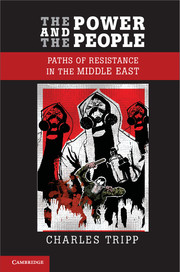Book contents
- Frontmatter
- Contents
- List of Illustrations and Credits
- Acknowledgements
- Glossary
- List of Abbreviations
- Introduction
- 1 State Capture and Violent Resistance
- 2 Contesting Public Space
- 3 Imposition and Resistance in Economic Life
- 4 Body Politics
- 5 History Wars
- 6 Symbolic Forms of Resistance
- Conclusion
- Notes
- Bibliography and Further Reading
- Index
Conclusion
Published online by Cambridge University Press: 05 January 2013
- Frontmatter
- Contents
- List of Illustrations and Credits
- Acknowledgements
- Glossary
- List of Abbreviations
- Introduction
- 1 State Capture and Violent Resistance
- 2 Contesting Public Space
- 3 Imposition and Resistance in Economic Life
- 4 Body Politics
- 5 History Wars
- 6 Symbolic Forms of Resistance
- Conclusion
- Notes
- Bibliography and Further Reading
- Index
Summary
Completing the manuscript of this book during the year 2011 was a strange and sobering experience. The dramatic events that began in Tunisia, tearing across North Africa and the Middle East, ‘from the ocean to the Gulf’, as the old Arab nationalist slogan had it, provided an exhilarating but also moving and sometimes desperately sad accompaniment. Writing about resistance, its many forms and its historical as well as contemporary manifestations is one thing. But watching it daily in action as people rise up against long-established systems of repression that have become complacent in their contempt and cruelty has been something very different. It has also given the generic term ‘resistance’ a human face, linked to tales of exceptional courage and resilience. The stories of apparently ordinary people become extraordinary through their behaviour under pressure and in the midst of exceptional events. Across the region, men and women have risked everything to stand up and to reclaim long-denied rights as human beings and as citizens. Many have paid for this with their lives.
These events have also encouraged reflection on some of the major questions raised by this book and its thematic treatment of the subject. In reality, in any given country, these themes come together, reinforcing each other and shaping the resistance movement at a particular moment in history. Whether in Tunisia, Libya, Bahrain, Syria, Egypt or Palestine, those who defied the status quo have needed to deal with the problem of armed force, have explored the possibilities of collective civil action, have mobilized labour and have recaptured the space where men and women can act in common as citizens – and all of this at the same time. In doing so, they have been drawing on the narrative resources of resistance. Through histories, imaginings and identities, as well as through artistic and symbolic representations that both epitomize and help to build a changing consciousness, they have drawn upon memories and have fostered an awareness that things need not be like this – they can and must be otherwise.
- Type
- Chapter
- Information
- The Power and the PeoplePaths of Resistance in the Middle East, pp. 309 - 320Publisher: Cambridge University PressPrint publication year: 2013

